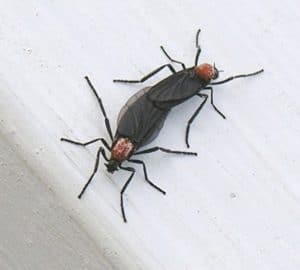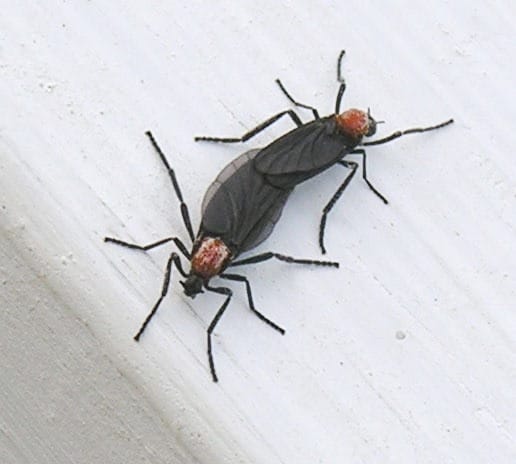Love Bugs make Florida their home because they thrive in warm, humid climates.
They are most commonly seen during their 2 mating seasons – the first is in the spring (April/May), and the second is in late summer (August/September).
If you’re seeing swarms of Love Bugs around your home or your car, you don’t need to be alarmed – they can be annoying, but they are harmless.
WHAT ARE LOVE BUGS?
• They are called Love Bugs because they are usually paired together with a mate. The male and female attach to each other and fly in tandem.
• They have black bodies with red heads, and are typically 6-9 millimeters in length.
• Although referred to as bugs, they are actually flies.
• They are only active during the day.
• The plants around your home can provide a food source for Love Bugs, as well as a breeding ground. The females look for moist environments, like mulch or compost, to lay their eggs.
• The good news is that even though these bugs are a nuisance, they don’t bite or sting, and cannot harm you or your pets.
WHAT’S ANNOYING ABOUT LOVE BUGS?
Love Bugs eat decaying plants and leaves, so they are attracted by the smell of decay. This may be why they are also drawn to the smell of exhaust emitted from vehicles, and are often seen swarming cars – which can be hazardous for both the driver and the bugs, here’s why:
• When they swarm cars, they can cover the windshield and create a hazard by impairing visibility.
• They can accumulate on the grill and block the air intake, which can cause the car to overheat.
• They often end up splattered on your headlights or windshield, and leave a sticky, smelly mess.
• Their acidic bodies can damage car paint if their remains are left to bake in the sun,
In order to avoid damage to the clear coat or paint, it’s best to wash them off as soon as possible with soapy water. Waxing your car before love bug season begins can make it easier to remove them from the paint.
WHAT CAN YOU DO?
Here are a couple of ways you can prevent a love bug infestation around your home:
• Clear up any standing water around your home
• Clear away plant debris – this will help to make your yard less habitable by removing both their food source and nesting material.
If you do have love bugs around your home, know that the females only live for three to six days, so the infestation will likely die out on its own in a few days.

